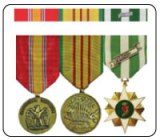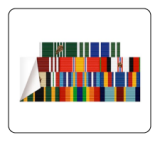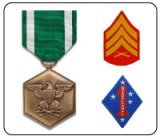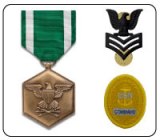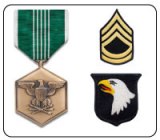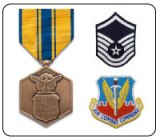
Medal of Honor |
||||||||||||||||||||||||||
|
||||||||||||||||||||||||||
Select a link for current military medals and military ribbons prices |
||||||||||||||||||||||||||
C2.1. PURPOSE The purpose of this Chapter is to furnish guidance to the Military Departments in the processing of recommendations for the MOH. C2.2. PROCEDURES INVOLVING RECOMMENDATIONS FOR THE MOH C2.2.1. The Secretary concerned shall establish procedures for processing recommendations for the award of the MOH in his or her Military Department. Minimally, those recommendations shall contain the endorsement of the subordinate Unified Combatant Commander or the JTF Commander, if involved; the Unified Combatant Commander concerned; and the Chairman of the Joint Chiefs of Staff. After endorsement by the Chairman of the Joint Chiefs of Staff, the recommendation shall be referred to the Secretary concerned for appropriate action. C2.2.2. The Army and Air Force MOH recommendations must be entered formally
into official channels in two years of the act warranting the recommendation, and
awarded in three years (except as provided in title 10 U.S.C. 3744 or 8744 (reference
(e)) and Section 1130 of title 10, U.S.C. (reference (a))). The Navy-Marine Corps
MOH recommendations must be formally entered into official channels in three years
of the act warranting the recommendation, and awarded in five years (except as provided
in Section 6248 of reference (f) and Section 1130 of reference (a)). However, a
Member of Congress can request consideration of a proposal for the award or
presentation of a decoration not previously submitted in a timely fashion under C2.2.3. Recommendations for award of the MOH disapproved by a Secretary of a Military Department, or the Secretary of Defense, may only be resubmitted if new, substantive and material information is provided in the time limits in 10 U.S.C. 3744, 6248, and 8744 (references (e) and (f)). The information forming the basis must have been previously unknown and not considered by recommending and disapproving officials. The determination of the existence of new material and substantive information being a basis for reconsideration may not be delegated below the Secretary of a Military Department. C2.2.3.1. The remaining bases for reconsideration are instances in which a Secretary of a Military Department or the Secretary of Defense determines there is evidence of material error or impropriety in the original processing or decision on a recommendation for award of the MOH. Examples of such instances might be loss of accompanying and/or substantiating documents to the recommendation or proven gender or racial discrimination. Determination of the existence of material error or impropriety in the original processing and decision shall not be delegated below the Secretary of a Military Department. In such cases, the Secretary of Defense shall determine the need for legislation. C2.2.3.2. All other instances of reconsideration shall be limited to those in which the formal recommendation was submitted in statutory time limits, the recommendation was lost or inadvertently not acted on, and when those facts are conclusively established by the respective Secretary of a Military Department or other official delegated appropriate authority. Those provisions are to protect the integrity and purity of purpose of the MOH by ensuring that all relevant information is submitted and considered while the actions are fresh in the minds of the witnesses. C2.3. PRESENTATION OF THE MOH
When practical, presentation of the MOH shall be made by the President of the United
States, as the Commander in Chief (CINC), in a formal ceremony in Washington, DC.
As such, premature public disclosure of information concerning recommendations,
processing and approval or disapproval actions is a potential source of embarrassment
to those recommended and the Government. Additionally, in the case of approved
recommendations, it could diminish the impact of ceremonies at which the presentation C2.4. COURTESIES AND PRIVILEGES AFFORDED MOH RECIPIENTS C2.4.1. Each recipient receives a monthly 400 dollar pension from the Department of Veterans Affairs (VA). C2.4.2. Enlisted recipients who retire with 20 or more years of Military Service receive a 10-percent increase in retired pay, not to exceed the 75 percent maximum. C2.4.3. Recipients are issued a special MOH Travel and Identification Card signed by the Secretary of a Military Department. That entitles recipients who are not on active duty and not military retirees to use space available military air transportation. C2.4.4. Unlike military personnel and retirees, MOH recipients may wear their uniforms at any time or place they choose. C2.4.5. Recipients who are not on active duty and not military retirees are issued a DoD Identification Card, as are their family members. It authorizes them military commissary, post exchange, and theater privileges. All of the Services, consistent with DoD policy, authorize use of morale, welfare, and recreation activities, including honorary club membership without dues. C2.4.6. Children of MOH recipients are not subject to quotas if they are qualified and desire to attend one of the U.S. military academies. C2.4.7. MOH recipients receive invitations to attend Presidential inaugurations and accompanying festivities. Military recipients and those who are civil servants have traditionally been authorized administrative absence instead of chargeable leave to attend. C2.4.8. The VA provides a special engraved headstone for deceased recipients of the MOH. C2.4.9. MOH recipients should be accorded on-base billeting commensurate with the prestige associated with the MOH. AP1.1.1. This Appendix contains a brief description of the various decorations that have been authorized for the Armed Forces of the United States: AP1.1.2.3. MOH (U.S. Air Force) AP1.1.2.3.1. The basis for the U.S. Air Force medal is the legislation
authorizing the U.S. Army medal. It was authorized specifically for the U.S. Air Force AP1.1.2.3.2. Awarded pursuant to Section 8741 of title 10, U.S.C. (reference (aaa)), by the President of the United States in the name of the Congress. The MOH may be awarded to members of the U.S. Air Force who distinguish themselves conspicuously by gallantry and intrepidity at the risk of their lives above and beyond the call of duty under any of the following conditions: AP1.1.2.3.2.1. While engaged in an action against an enemy of the United States. AP1.1.2.3.2.2. While engaged in military operations involving conflict with an opposing foreign force. AP1.1.2.3.2.3. While serving with friendly foreign forces engaged in an armed conflict against an opposing armed force in which the United States is not a belligerent party. C1.4.5.4. Release and distribute individual Service member’s rank, name, title of
award and legal residence/domicile (voting district and state or city and state as
determined by the Military Department concerned) to the Service member’s
Congressional delegation (Senate and House) when certain decorations are awarded.
This policy shall apply when the Service member is awarded one of the following medals
from the DoD or their respective branch of service: C1.4.5.5. Release and distribution of the information in paragraph C1.4.5.4.,
shall be made: C1.4.5.5.4. With the following statement attached: |
|
|||||||||||||||||||||||||

